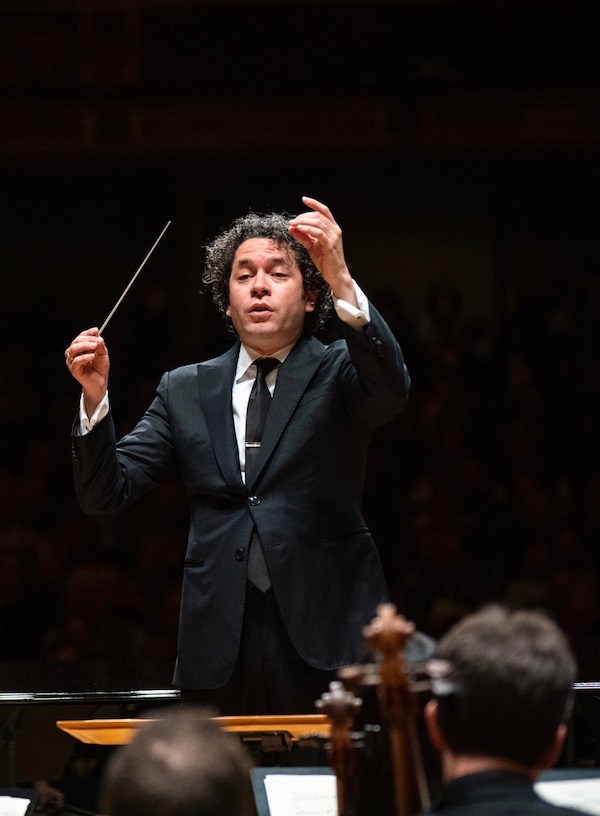Adams concerto given triumphant Boston debut by Wang, Dudamel, LA Phil

Gustavo Dudamel, Yuja Wang, and the Los Angeles Philharmonic Orchestra returned to Symphony Hall Saturday afternoon. They brought with them a typically eclectic program, one that touched on (among other things) vernacular influences in art and nationalism in music as heard in works by Alberto Ginastera, John Adams, and Stravinsky.
Presented by the Celebrity Series, the event was highlighted by the local debut of Adams’s piano concerto, Must the Devil Have All the Good Tunes?, which was premiered earlier this year.
Its wordy title was inspired by a quote from a New Yorker article Adams read on the social activist Dorothy Day, and is plenty ironic: the composer, after all, is not known for being much of a tunesmith and, a couple of jazzy riffs over its last third notwithstanding, he didn’t break that mold in this concerto.
At the same time, Must the Devil Have All the Good Tunes? is agreeably dark-hued. The influence of funk is never far off, either in the music’s driving rhythmic patterns or its striking instrumentation (which utilizes – very effectively – a bass guitar and a “de-tuned” honky-tonk piano).
Adams’s comments on the piece further note the character of Liszt’s Totentanz hovering nearby.
You hear this in various ways throughout its twenty-five-minute duration. The opening section begins with a lurching, gospel-like phrase played by the piano and low strings that’s followed by punchy gestures between piano and orchestra and glowering snorts from the low brasses.
In the middle comes a quieter episode that begins with the solo piano embellishing a set of patterns around sustained string chords. Eventually, a descending melodic line emerges in the orchestra and recurs, like a lamenting gesture from Monteverdi, while the piano continues its meditation.
Gradually, this dissipates and the final section commences. It begins with a whirling piano tune that evokes a tarantella before jabbing figures redolent of the first part return. With the energy level building and the piano line incorporating shades of the blues, the orchestra responds with savage, slashing interjections. Just before the end, three sustained D octaves freeze the momentum. After the last of them, the piano starts up again, only to be cut off by a braying, discordant blast.
Exhilarating, moving, and harrowing, Must the Devil Have All the Good Tunes? is, ultimately, a triumph. The absorption of vernacular elements into Adams’s distinct style is nothing new. But the naturalness with which bravura keyboard writing; hints of jazz, funk, and other musics; a keen handling of the orchestra; and a riveting sense of drama come together here is special.
Moreover, the score’s overt pessimism, in this context, highlights a connection between Adams’s music and popular sources (particularly those that speak for oppressed voices in American society) that doesn’t always come across viscerally in his output.
That they do so clearly here is due, in no small part, to Wang, for whom Adams wrote the piece. She’s not a pianist known for championing contemporary fare. Yet on Saturday she showed herself a fine a purveyor of new music, playing with terrific force of character, freewheeling rhythmic energy, and radiant color.
Wang projected brilliantly over the orchestra in the work’s biggest moments. But it was in Why Must the Devil’s subdued middle part that she was most impressive, bringing a beguiling dose of lyricism and tenderness to Adams’s crystalline keyboard writing.
Afterwards, the pianist let loose with a pair of encores – Arturo Márquez’s Danzon No. 2 (in her own arrangement) and Nikolai Kapustin’s Toccatina – both played at lightning speed.
Dudamel led the LAPO in snappy, vibrant accompaniment. Particularly striking, though, was the delicate mid-concerto dialogue between Wang and the orchestral keyboard.
Ginastera’s 1953 Variaciones concertantes was the afternoon’s opener. Essentially a concerto for chamber orchestra, the variations are built around a loosely pentatonic theme that’s treated to a series of characteristic developments (“Variazione in modo di scherzo,” “Variazione ritmica,” “Variazioni pastorale,” and so on) which showcase different instruments of the orchestra.
Saturday’s reading evinced a strong sense of character, as well as a fine blend of tone and articulation across the ensemble, even if the reading didn’t fully crack the Variaciones’ austere outer shell.
Nevertheless, a soulful telling of the theme was followed by some spirited, careening flute playing in the “Variazione giocosa.” The scherzo variations married raucous clarinet licks with earthy string gestures (thumping pizzicatos and icy sul ponticello arpeggios among them), and the “Variazione finale in modo di rondo” – itself an adaptation of an Argentine malambo – was brash and driving.
In between came a soaring viola solo in “Variazione drammatica,” warmly-plangent double reeds in the “Variazione canonica,” and golden-toned horn solos in the “Variazione pastorale.”
Rounding out the afternoon was a bracing Rite of Spring that, in just about every way, was played to the hilt. The “Introductions” to both parts were warmly lyrical and impressively diffuse, texturally. “Augurs of Spring” was rhythmically tight and menacing, while “Spring Rounds” built to a howling, orgiastic zenith. The “Dance of the Earth” and “Sacrificial Dance” thundered.
Afterwards, in response to a vociferous ovation, Dudamel led the LAPO in a swaggering encore of John Philip Sousa’s The Liberty Bell March. Here, in the trio’s only overt outing of the afternoon, nationalism, the vernacular, and a vision of patriotism comingled lustily together.
The program will be repeated at Carnegie Hall Monday night. carnegiehall.org
The Celebrity Series presents pianist Joyce Yang playing music by Grieg, Schumann, Carl Vine, and Liszt 8 p.m. December 4 at Pickman Hall. celebrityseries.org; 617-482-6661